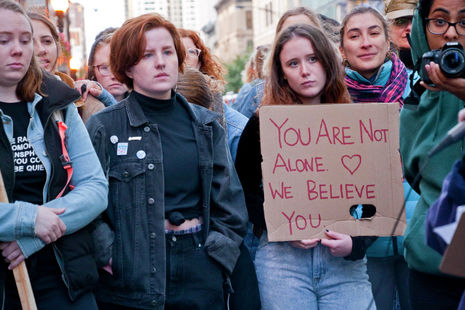Cambridge’s procedures are failing assault survivors
Through her own experiences, Frankie Richards argues that the University’s Harassment and Sexual Misconduct procedure is underpinned by slut-shaming and misogynistic ideology

Content note: this article contains detailed discussion of rape and sexual assault
Met Police officer Wayne Couzens has just pleaded guilty to the murder, kidnap and rape of Sarah Everard. After this plea, Met Commissioner Dame Cressida Dick expressed “how very sorry [I] am for their [Sarah’s family] loss and their pain,” and how “Sarah was a fantastic, talented woman with her whole life ahead of her.”
As a survivor of rape and sexual assault myself, these comments seem more hollow than heartfelt. Professing sympathy for the victim and their families can only get you so far. Whilst I firmly assert that survivors need emotional and psychological support, and the funding associated with these, we also need action. We need systems of justice that operate with total belief of the survivor and perceive the survivor's ability to come forward with their trauma as evidence supporting their case. We need an end to the slut-shaming rhetoric which interrogates what the survivor was wearing or their sexual history rather than the perpetrator’s actions. In short, we need an intrinsic and holistic change in all areas of society – with Cambridge being no exception.
“I spent over a year fighting to have the University recognise I was raped and assaulted in the hope that disciplinary repercussions would follow. Spoiler alert, they have not”
Cambridge University is failing survivors of sexual assault. The University’s Harassment and Sexual Misconduct reporting procedure is underpinned by slut-shaming and misogynistic ideology. Put simply it is not fit for purpose – and the University is okay with that.
I spent over a year fighting to have the University recognise I was raped and assaulted in the hope that disciplinary repercussions would follow. Spoiler alert: they have not. Though I am silenced under confidentiality agreements as part of the University reporting procedures, I can still spotlight the epistemic slut-shaming that Cambridge’s reporting procedure produces – so here goes.
For starters, if we’re going to talk about reporting sexual assault and rape to the University, we have to talk about sexting. I reported my sexual assault to both the University’s informal and formal OSSCA (Office of Student Conduct, Complaints and Appeals) procedures. After a year, my case finally went to a formal disciplinary hearing during which I spent more than two hours being asked the same questions: “was this your first sexual relationship?”, “what were you wearing at the time?”, “did you enjoy being hit?”. From their point of view, this was a 2-hour masterclass in misogynistic victim-blaming, and the committee certainly over-delivered.
From this demeaning, soul-destroying experience the message the University committee had for me was clear: “you're a slut because you sexted, and these sexts are evidence of consent.” I was outraged. To paraphrase the infamous ‘Tea and Consent’ YouTube video that I’m sure we’ve all watched during consent workshops, even if you send a text saying you want tea, that does not mean someone has the right to pour it down your throat! The assumption that if you are female (as I am) and discuss sex then you must be up for any sexual activity is a blatant example of the University’s slut-shaming and victim-blaming approach.
“The assumption that if you are female (as I am) and discuss sex then you must be up for any sexual activity is a blatant example of the University’s slut-shaming and victim-blaming approach”
So now we’ve talked about sex, let’s talk about silence. According to the University disciplinary committee, my silence during the assault was evidence of my consent. Again, the University displays archaic perceptions of consent and the psychological repercussions displayed in response to sexual assault. The fight, flight or freeze response is well understood in survivor support systems; it is very common for those experiencing assault to freeze, as I did, and dissociate as a form of self-preservation. A survivor may not be in a safe environment to fight, and other imbalances in the relationship such as differences in physical strength, coercive behaviour, threats, and gaslighting can contribute to this response.
It doesn’t, or more importantly – it shouldn't take a genius to understand this, and yet based on the disciplinary committee’s response to my case, serious education on survivor trauma and consent needs to occur. The system isn’t fit for purpose if those in power don’t have up-to-date knowledge of the matters they are tasked with. Additionally, those on the receiving end of this short-sighted ignorance shouldn’t have to suffer as a consequence. Despite being in one of the best universities in the world, the reporting system, and those operating it, need serious re-education.
So now what? I’m certainly not the first person to report to OSSCA, and sadly I know that I won’t be the last. In March 2021, an investigation by UN Women UK found that 97% of women between the ages of 18-24 have been sexually harassed, and 96% of those survivors didn’t report their experiences due to a lack of faith that the justice system would change anything. The University’s reporting system mirror’s the UK’s inadequate criminal justice system in its failure of survivors. So what can the University do to dismantle its archaic reporting system to generate justice?
Firstly, Cambridge can start by actually listening to the survivors who come forward. It isn’t rocket science. Respect those who have the strength to come forward. Regard their bravery as evidence of their trauma. Demonstrate that the reporting system produces consequences so that more survivors have faith in the system and speak out. Equally, just because we all earn our right to study at Cambridge, doesn’t mean we have the right to stay here. In short, kick out the rapists! This would be an important stepping-stone for some semblance of justice.
It’s an interesting term, Justice. Forgive me for perhaps being cynical but reflecting on my own experiences and in light of the developments in Sarah Everard’s case, I don’t think justice can ever truly occur. Yes, we can build systems that convict rapists, and protect survivors of trauma but all this is very reactionary. Sarah Everard can never experience justice because she was murdered. I can never experience justice because I’ve already been raped. But not only do I carry this lifelong trauma, but I am scarred by Cambridge's so-called ‘discipline’ system which defends abusers instead of protecting survivors. Dear Cambridge, you can – and you must – do better.
 Features / Are you more yourself at Cambridge or away from it? 27 January 2026
Features / Are you more yourself at Cambridge or away from it? 27 January 2026 News / Vigil held for tenth anniversary of PhD student’s death28 January 2026
News / Vigil held for tenth anniversary of PhD student’s death28 January 2026 Interviews / Lord Leggatt on becoming a Supreme Court Justice21 January 2026
Interviews / Lord Leggatt on becoming a Supreme Court Justice21 January 2026 News / Reform candidate retracts claim of being Cambridge alum 26 January 2026
News / Reform candidate retracts claim of being Cambridge alum 26 January 2026 Comment / How Cambridge Made Me Lose My Faith26 January 2026
Comment / How Cambridge Made Me Lose My Faith26 January 2026










